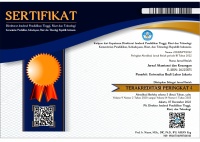SPIRITUALITAS UNTUK MEWUJUDKAN LINGKUNGAN KERJA POSITIF DAN MOTIVASI INTRINSIK
Abstract
This study intends to provide an overview the implications of spiritual values in management control system (MCS) of organizational culture and employee care center towards intrinsic motivation and spirituality at workplace. This study uses the case study method to see and interpret social phenomena. Data collected through interview, observation, and document analysis. Research concludes that MCS instill spiritual values could build a work environment and shared experience, also brings positive influence on spirituality at work. Spirituality eliminates competition, build teamwork, and increase opportunities to learn and grow together as a community. Employees responded positively to company's growth as an opportunity to have greater goals, contribute to make company better, and self-actualize that brings satisfaction and happiness. Money is no longer a motivation to work better and stay in company, but employees look for opportunities and support to be involved, contribute, and develop themselves.
Keywords
Full Text:
PDFReferences
Afsar, B., Badir, Y., & Kiani, U. S. (2016). Linking spiritual leadership and employee pro-environmental behavior: The influence of workplace spirituality, intrinsic motivation, and environmental passion. Journal of Environmental Psychology, 45, 79–88. https://doi.org/10.1016/j.jenvp.2015.11.011
Bhatia, M., & Varshney, N. (n.d.). Workplace Spirituality/Culture & Indian Business Organisations. VIMARSH, 1.
Çınar, O., & Aslan, I. (2011). A MOTIVATION STUDY ON THE EFFECTIVENESS OF INTRINSIC AND EXTRINSIC FACTORS View project Örgüt Geliştirmede Kritik Başarı Faktörleri View project. December 2014.
Dean, D. J. (2020). Soulful Work for Happy Employees. In The Routledge Companion to Happiness at Work (pp. 110–122). Routledge.
Deci, E. L., & Ryan, R. M. (2012). Motivation, personality, and development within embedded social contexts: An overview of self-determination theory.
Devendhiran, S., & Wesley, J. R. (2017). Spirituality at work: enhancing levels of employee engagement. Development and Learning in Organizations, 31(5), 9–13. https://doi.org/10.1108/DLO-08-2016-0070
Eferin, S. (2016). Sistem Pengendalian Manajemen Berbasis Spiritualitas. Yayasan Rumah Peneleh.
Efferin, S. (2015). Akuntansi, Spritualitas dan Kearifan Lokal Beberapa Agenda Penelitian Kritis. Jurnal Akuntansi Multiparadigma, 6(3), 466–480. https://doi.org/10.18202/jamal.2015.12.6037
Efferin, S., & Hutomo, C. C. (2021). Spirituality, happiness and auditors’ commitment: an interbeing perspective. Accounting, Auditing & Accountability Journal.
Fairchild, R. J. (2010). Editorial : Contemporary behavioural issues in accounting research Abed Al-Nasser Abdallah *. 1(3), 179–181.
Giacalone, R., Jurkiewicz, C., & Fry, L. (2005). From advocacy to science. The Psychology of Religion and Spirituality, 515–528.
Hackett, T. B., Burgess, S. W., & Martin-Jones, K. (2020). Religion as a Foundation for a Happy Life. In The Routledge Companion to Happiness at Work (pp. 143–152). Routledge.
Hassan, M., Bin Nadeem, A., & Akhter, A. (2016). Impact of workplace spirituality on job satisfaction: Mediating effect of trust. Cogent Business & Management, 3(1), 1189808.
Hennessey, B., Moran, S., Altringer, B., & Amabile, T. M. (2015). Extrinsic and Intrinsic Motivation. Wiley Encyclopedia of Management, 1–4. https://doi.org/10.1002/9781118785317.weom110098
Jeong, S., & Burton, O. (2020). Happiness on Your Own Terms: A Photovoice Method on Happiness Research and Intervention. In The Routledge Companion to Happiness at Work (pp. 23–36). Routledge.
Joelle, M., & Coelho, A. M. (2019). The impact of spirituality at work on workers’ attitudes and individual performance. The International Journal of Human Resource Management, 30(7), 1111–1135.
Jurkiewicz, C. L., & Giacalone, R. A. (2004). A values framework for measuring the impact of workplace spirituality on organizational performance. Journal of Business Ethics, 49(2), 129–142.
Kaplan, R. S., & Norton, D. P. (2004). Measuring the Strategic Readiness of Intangible Assets. Harvard Business Review, 82(2).
Krause, W. (2020). Being Happy in Spite of Setbacks. In The Routledge Companion to Happiness at Work (pp. 37–44). Routledge.
Marques, J. (2020). Internalizing Happiness: At Work and Anywhere Else. In The Routledge Companion to Happiness at Work (pp. 3–12). Routledge.
Marques, J., Dhiman, S., & King, R. (2005). Spirituality in the workplace: Developing an integral model and a comprehensive definition. The Journal of American Academy of Business, Cambridge, 7(1), 81–91.
Mehta, Y. (2010). Impact of workplace spirituality on organization culture through improved employee productivity. AIMS International Conference on Value-Based Management, 63(3), 221–226.
Merchant, K. A., & Van der Stede, W. A. (2018). Management control systems - Performance Measurement, Evaluation and Incentives. In Pearson Education Limited.
Milliman, J., Czaplewski, A. J., & Ferguson, J. (2003). Workplace spirituality and employee work attitudes: An exploratory empirical assessment. Journal of Organizational Change Management, 16(4), 426–447. https://doi.org/10.1108/09534810310484172
Nguyen, T.-D. (2020). Making Work a Happy Practice. In The Routledge Companion to Happiness at Work (pp. 51–60). Routledge.
Petchsawang, P., & McLean, G. N. (2017). Workplace spirituality, mindfulness meditation, and work engagement. Journal of Management, Spirituality and Religion, 14(3), 216–244. https://doi.org/10.1080/14766086.2017.1291360
Pink, D. H. (2011). Drive: The surprising truth about what motivates us. Penguin.
Preston, J. L., & Shin, F. (2017). Spiritual experiences evoke awe through the small self in both religious and non-religious individuals. Journal of Experimental Social Psychology, 70(May), 212–221. https://doi.org/10.1016/j.jesp.2016.11.006
Schein, E. H. (2010). Organizational culture and leadership (Vol. 2). John Wiley & Sons.
Senaji, T. A., & Anyanje, V. S. (2020). Elusive Happiness: Does Spirituality Matter? In The Routledge Companion to Happiness at Work (pp. 192–207). Routledge.
Sengupta, S. S. (2020). Intrinsic Motivation as a Driver of Happiness. In The Routledge Companion to Happiness at Work (pp. 45–50). Routledge.
Triyuwono, I. (2015). Awakening the Conscience Inside: The Spirituality of Code of Ethics for Professional Accountants. Procedia - Social and Behavioral Sciences, 172, 254–261. https://doi.org/10.1016/j.sbspro.2015.01.362
Van der Walt, F., & De Klerk, J. J. (2014). Workplace spirituality and job satisfaction. International Review of Psychiatry, 26(3), 379–389.
Xinyan, X. (2013). Chinese dialectical thinking - The yin yang model. Philosophy Compass, 8(5), 438–446. https://doi.org/10.1111/phc3.12035
DOI: https://doi.org/10.36080/jak.v11i1.1699
Refbacks
- There are currently no refbacks.

This work is licensed under a Creative Commons Attribution 4.0 International License.
Fakultas Ekonomi dan Bisnis, Program Studi Akuntansi. Universitas Budi Luhur, Jl. Ciledug Raya, Petukangan Utara, Jakarta Selatan, DKI Jakarta 12260, Indonesia

This work is licensed under a Creative Commons Attribution 4.0 International License.












